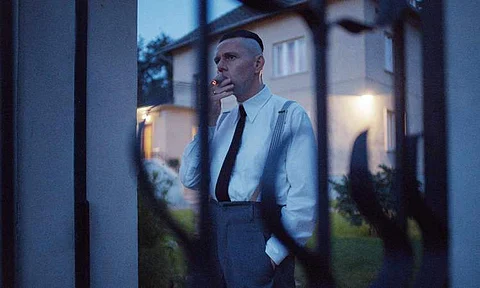

What are movies for if not to help understand our society—and through it, ourselves? Tamil filmmaker Karthik Subbaraj said in a recent conversation with us, “If it weren’t for cinema, I’d never have truly learned about or understood the horrors of World War 2.” The best films in the genre—from Life is Beautiful and Schindler’s List and Grave of the Fireflies to the recent Oppenheimer—remind us of the dangers of prejudice and the consequent compliance of ordinary people, while their neighbourhoods fill up with the corpses of the innocent. Some WW2 films have tried to capture the malice of the powerful; some others have tried to capture the terror of the vulnerable. So, when Jonathan Glazer’s historical drama, The Zone of Interest, was screened on Monday—on the penultimate day of IFFI, Goa—I wasn’t going to miss it. It helped that this film comes after a much-acclaimed premiere at Cannes, earlier this year, where it won the Grand Prix and the FIPRESCI Prize.
The Zone of Interest isn’t about the family of victims, as we are so often used to seeing. It’s instead about the family run by Auschwitz commandant, Rudolf Höss. For a film touted to be a drama, there’s very little of it in the dynamic sense of that word. It’s a film that quietly (and I mean this literally, given the general absence of a background score) captures the dreams and aspirations of this family whose house and “paradise-like garden” is situated right next to a concentration camp. Höss’s wife, Hedwig, is proud of her beautiful garden, as she walks around, familiarising her daughter with roses and dahlias.
Höss himself—while he’s not supervising the genocide (which we see nothing of)—is busy fishing, going horse-riding, telling stories, and tending to lilac bushes. In another film, these would be mundane events, testing our patience. Here though, there’s the constant awareness of the ethnic cleansing taking place just beyond the wall, murders that Höss and family seem to be completely okay with. It’s a horror film almost, which through capturing the everyday life of this family, makes us see how anyone could so easily become complicit to such evil.
In considering the genocides of the past, and the dehumanisation and the other-ing of communities that often preceded them, we often like to tell ourselves that had we lived in that time, we would have behaved differently. In saying, “I can’t believe they let it happen”, we often try to suggest that we wouldn’t have let it happen. We forget though that the people who were complicit during that time, likely told themselves the same, when considering horrors that had occurred before their time. Watching the members of Höss’ family go about their life and fuss over seemingly insignificant details around their home, it’s tempting to express shock at their indifference to the mass murders happening next door. It’s tempting to see them as inherently cruel beings who lack conscience. It’s tempting to ‘other’ them.
However, the horror of The Zone of Interest lies in the realisation that they are not as abnormal, or as detached from us, as we might believe. The chills come not just from hearing the distant gunshots in the film and how no one in the family seems to be reacting to them; they also come from the possibility that any of us could turn into them if we don’t insulate ourselves from the ‘us versus them’ rhetoric. As Alastor Moody from Harry Potter often yelled, “Constant vigilance!”